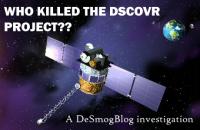Here is the latest bizarre twist in our investigative series on the Deep Space Climate Observatory (DSCOVR).
To recap, NASA was given over $100 million in taxpayers money to build a spacecraft that would look at the energy budget of our planet from a unique perspective. Even though it is fully completed over five years ago, it is still sitting in a box at the Goddard Space Centre.
According to leading scientists in a recent paper in the esteemed journal Science, this spacecraft would dispel much existing uncertainty about the pace of climate change. Specifically, after spending literally billions of dollars in low-Earth orbit studies, there is a still a glaring discrepancy in our understanding of the planet’s energy balance of 4-6watts per square metre – that is roughly two to three times the effect of atmospheric C02.
DSCOVR would help resolve that problem because it would not be observing our planet from low Earth orbit.- its instruments would gaze back at Earth from 1.5 million kilomteres away at a gravitational parking spot between the Earth and Sun, far beyond the orbit of the Moon. The data provided by DSCOVR would compliment measurements from conventional climate satellites and give us a much clearer idea of our changing climate.
The reasons why NASA decided to quietly cancel the mission early last year remain a mystery. So are the reasons why NASA refuses to disclose any internal documents relating to this decision, even under the Freedom of Information Act.
What we do know is that another government agency is interested in securing DSCOVRfor the better prediction of space weather. The National Oceanic and Atmospheric Administration (NOAA) apparently wants DSCOVR at L1 so it can provide better information of solar flares that are approaching Earth.
Literally billions of dollars of satellite hardware are at risk from high-energy solar flares that can destroy sensitive orbiting instruments. Besides providing critical climate data, DSCOVR would replace aging sun monitoring spacecraft already at L1. This would provide engineers about an hour of advance warning of approaching solar storms so that expensive satellites can be shut down before nasty space weather hits.
Here’s the rub. Even though NOAA has apparently secured alternate funding to bankroll the launch and maintenance of DSCOVR, NASA so far has not yet provided the spacecraft.
One might understand why NASA would be reluctant to give American space hardware to the Ukrainians or the French, both of which offered to launch DSCOVR themselves. But another federal US agency?
To recap: NASA built it. Stored it. Cancelled it, Refused to allow offer countries to launch it. Refused to release any information on why it was cancelled, and now they won’t let another US government agency have it either.
The story gets stranger by the week. Next week: Following the money.
Here’s the previous stories we’ve done:
Part 1: the background
Part 2: How politics conspired to kill DSCOVR
Part 3: Digging for answers from NASA
Part 4: FOIA, NASA, DSCOVR – my acronym hell
Please help us in our investigation by donating to DeSmogBlog and Project Uncover DSCOVR.
Subscribe to our newsletter
Stay up to date with DeSmog news and alerts






